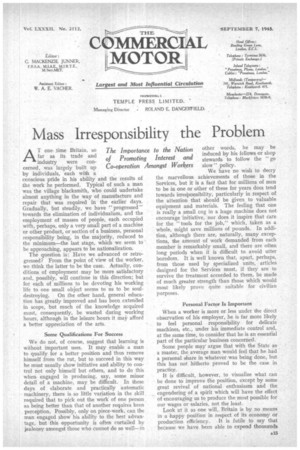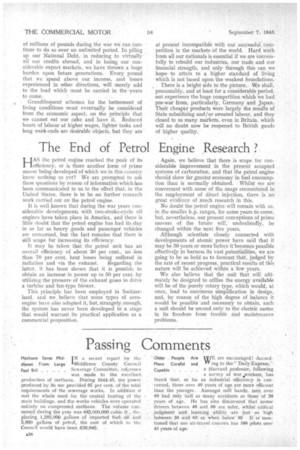Mass Irresponsibility the Problem A T one _time Britain, so far
Page 17

Page 18

If you've noticed an error in this article please click here to report it so we can fix it.
as its trade and industry were concerned, was largely built up by individuals, each with a conscious pride in his ability and the results of the work he performed. Typical of such a man was the village blacksmith, who could undertake almost anything in the way of manufacture and repair that was required in the earlier days. Gradually, but steadily, we have "progressed" towards the elimination of individualism, and the employment of masses of people, eaoh occupied with, perhaps, only a very small part of a machine or other product, or section of a business, personal responsibility being, in the majority, reduced to the minimum—the last stage, which we seem to ' be approaching, appears to be nationalization.
The question is: Have we advanced or retrogressed? From the point of view of the worker, we think the latter to be the case. Actually, conditions of employment may be more satisfactory and, possibly, will continue in this direction; but for each of millions to be devoting his working life to one small object seems to us to be souldestroying. On the other hand, general education has greatly improved and has been extended in scope, but much of the knowledge acquired must, consequently, be wasted during working hours, although in the leisure hours it ma.S7 afford a better appreciation of the arts.
Some Qualifications For Success We do not, of course, suggest that learning is without important uses. It may enable a man to qualify for a better position and thus remove himself from the rut, but to succeed in this way he must usually show initiative and ability to control not only himself but others, and to do this when engaged in producing, say, some minor detail of a machine, may be difficult. In these days of elaborate and practically automatic machinery, there is so little variation in the skill required that to pick out the work of one person . as being better than that of another requires keen perception. Possibly, only on piece-work, can the man engaged show his ability to the best advantage, but this opportunity is often curtailed by jealousy amongst those who cannot do so well—in other words, he may be induced by his fellows or shop stewards to follow the "go slow" policy.
We have no wish to decry the marvellous achievements of those in the Services, but it is a fad that for millions of men to be in one or other of these for years does tend towards irresponsibility, particularly in respect of the attention that should be given to valuable equipment and materials. The feeling that one is really a small cog in a huge machine does not encourage 'initiative, nor does it inspire that care for the "tools for the job," which, taken as a whole, might save millions of pounds. In addition, although there are, naturally, many exceptions, the amount of work demanded from each member is remarkably small, and there are often long periods when it is difficult to avoid utter boredom. It is well known that, apart, perhaps, from those used by specialized units, article designed for the Services must, if they are to survive the treatment accorded to them, be made of much greater strength than those which would most likely prove quite suitable for civilian purposes.
Personal Factor Is Important When a worker is more or less under the direct observation of his employer, he is far more likely to feel personal responsibility for delicate machines, etc., under his immediate control and, at the same time, to consider that he is an essential Part of the particular business concerned.
Some people may argue that with the State as a master, the average man would feel that he had a personal share in whatever was being done, but this has not hitherto proved to be the case in practice. It is difficult, however, to visualize what can be done to improve the position, except by some great revival of national enthusiasm and the engendering of a spirit which will have the effect of encouraging us to produce the most possible for our wages or salaries, not the least.
Look at it as one will, Britain is by no means in a happy position in respect of its economy or production efficiency. It is futile to say that because we have been able to expend thousands of millions of pounds during the war we can continue to do so over an unlimited period. Inpiling up our National Debt, in reducing to virtually nil our credits abroad, and in losing our considerable export markets, we have thrown a huge burden upon future generations. Every pound that we spend above our income, and losses experienced in other directions, will merely add to the load which must be carried in the -years to come.
Grandiloquent schemes for the betterment of living conditions must eventually be considered from the economic aspect, on the principle that we cannot eat our cake and have it. Reduced hours of labour at higher wages, lighter tasks and long week-ends are desirable objects, but they are at present incompatible with our successful competition in the markets of the world. Hard work from all our nationals is essential if we are successfully to rebuild our industries, our trade and our financial strength, and only through this can we hopeto attain to a higher standard of living which is not based upon the weakest foundations.
There is a bright side to the picture. We shall, presumably, and at least for a considerable period, not experience the huge competition which we had pre-war from, particularly, Germany and Japan.. Their cheaper products were largely the results of State subsidizing and/or sweated labour, and they closed to us many markets, even in Britain, which will no doubt now be reopened to British goods of higher quality.




















































